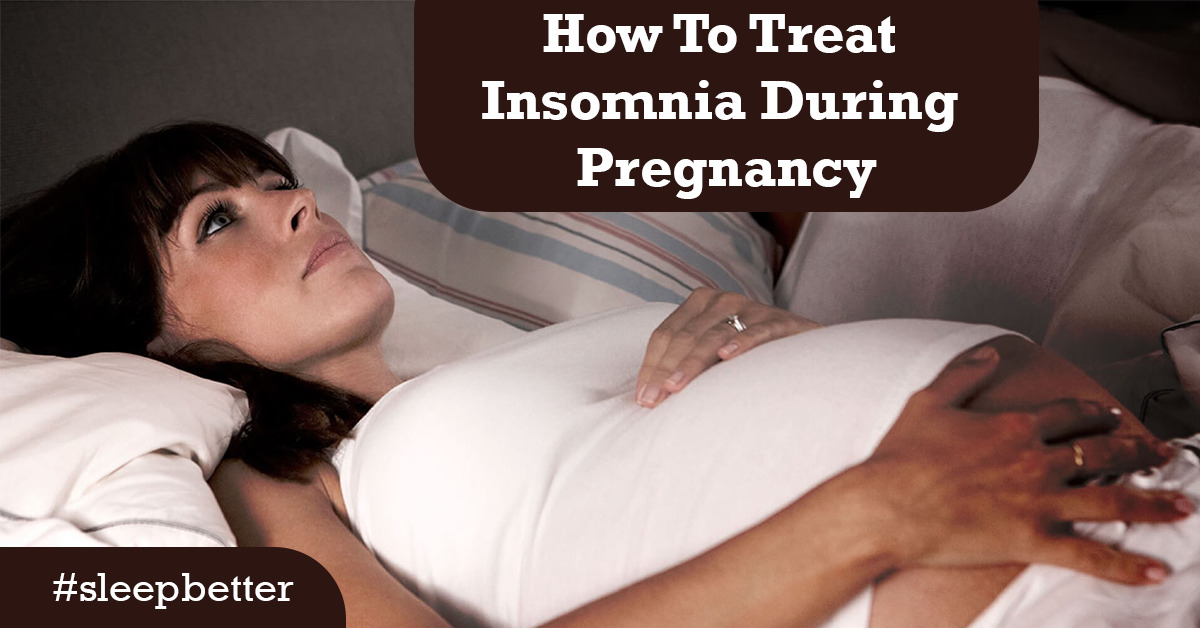
How To Treat Insomnia During Pregnancy: Pregnancy is a time of excitement, joy, and anticipation. However, it can also be a time of sleepless nights, especially for women who suffer from insomnia. As a wise old saying goes, “sleep like a baby,” but what happens when you’re expecting one?EnoughInfo.com

If you’re finding yourself tossing and turning all night, struggling to find a comfortable position, and feeling exhausted during the day, it’s time to take action. Let’s explore some creative and effective ways to treat insomnia during pregnancy so you can get the rest you and your growing baby need.
FAQs & Answers on How To Treat Insomnia During Pregnancy
1. Is it safe to take sleep aids during pregnancy?
It’s important to talk to your healthcare provider before taking any medication, including sleep aids, during pregnancy. Some sleep aids can be harmful to your developing baby, so it’s important to only take medication under the guidance of a healthcare professional.
2. Can I drink herbal tea to help me sleep during pregnancy?
Some herbal teas can be safe during pregnancy, but others can be harmful. It’s important to talk to your healthcare provider before drinking any herbal tea to make sure it’s safe for you and your baby.
3. Can I exercise before bedtime to help me sleep?
It’s generally not recommended to exercise too close to bedtime, as it can stimulate your body and make it harder to fall asleep. It’s best to exercise earlier in the day to help improve sleep quality.
Should I avoid napping during the day if I’m having trouble sleeping at night?
It depends on the individual. For some pregnant women, taking a nap during the day can help improve sleep quality at night. However, for others, napping during the day can make it harder to fall asleep at night. It’s best to listen to your body and experiment with different sleep patterns to determine what works best for you.
What is pregnancy insomnia?
Pregnancy insomnia is a type of sleep disorder that occurs during pregnancy. It is characterized by difficulty falling asleep or staying asleep, waking up too early in the morning, and feeling tired during the day. It is a common problem among pregnant women and can be caused by a variety of factors, including hormonal changes, physical discomfort, anxiety, and stress. Pregnancy insomnia can lead to exhaustion, mood swings, and difficulty concentrating, which can negatively impact a woman’s quality of life. It is important for pregnant women to talk to their healthcare provider if they are experiencing insomnia, as there may be treatment options available to help improve their sleep.15 Low-Impact Exercises For Pregnant Women
Causes of pregnancy insomnia
Snoring: Pregnancy-related weight increase and stuffy noses constrict the upper airway, making it harder for air to travel through. As a result, pregnant women may snore or have breathing problems, especially when resting on their backs.
Back ache: The majority of pregnant individuals have back discomfort, even in the early stages of pregnancy, due to changes in their muscles, joints, and posture.
Leg pain: About half of pregnant women feel leg cramps, and a quarter of pregnant women may also develop restless legs syndrome (RLS). In later pregnancy, RLS can make it difficult to fall asleep because it generates painful leg sensations.
Nighttime bathroom trips: The expanding foetus not only puts strain on the bladder, but pregnancy also results in an increase in blood volume, which causes the kidneys to generate more urine. The majority of pregnant women experience nighttime urination needs of two or more, which can interfere with sleep.
Heartburn: Heartburn is a common nighttime symptom of pregnancy, especially in later stages, and it can be disruptive to sleep. In addition to the uterus pressing on the digestive tract, pregnancy hormones also facilitate simpler esophageal reflux of stomach acid.
Physical discomfort: It might be challenging to find a comfortable sleeping position as the belly expands and foetal movements become more obvious. For people who are used to sleeping on their back or their stomach, switching to side sleeping may be challenging.
Anxiety: It is normal to worry when you are expecting a child. Some women may experience nightmares or sleeplessness due to pregnancy-related stress or impending life changes.
Nausea: Nighttime episodes of nausea, which can interfere with sleep, can start early in pregnancy.
Hormones: Pregnancy-related changes in hormone levels might impact sleep habits.
Altered metabolism: A person’s metabolism and heart rate are both increased during pregnancy, which might make it difficult to wind down for sleep.22 Ways To Fall Asleep Fast (The Ultimate guide on Beating Insomnia)
Treating insomnia during pregnancy
1. Establish a regular sleep routine
It’s important to have a consistent sleep schedule to help regulate your body’s internal clock. Try to go to bed and wake up at the same time every day, even on weekends. This helps your body anticipate when it’s time to sleep and when it’s time to wake up.
2. Create a comfortable sleep environment
Make sure your bedroom is conducive to sleep. Keep the room cool, dark, and quiet. Use blackout curtains or a sleep mask to block out any light that may be disrupting your sleep. Use earplugs or white noise to block out any noise that may be keeping you awake. Invest in a comfortable mattress and pillows to reduce any physical discomfort.
3. Use pillows
To ease back discomfort, support the lower back, the area between the knees, and the stomach using cushions. Some expectant women might like a pregnancy cushion that is specially made to meet their body’s changing demands.
4. Avoid caffeine and other stimulants
Caffeine is a stimulant that can interfere with sleep. Limit your intake of caffeine or avoid it altogether. Remember that caffeine is not just found in coffee, but also in tea, chocolate, and some medications. It’s also a good idea to avoid other stimulants like nicotine and alcohol.
5. Exercise regularly
Regular exercise can help improve sleep during pregnancy. However, it’s important to check with your healthcare provider before starting any new exercise program. Aim for at least 30 minutes of moderate exercise most days of the week, but not too close to bedtime as it can stimulate your body and keep you awake.
6. Practice relaxation techniques
Stress and anxiety can interfere with sleep, especially during pregnancy. Try relaxation techniques like deep breathing, meditation, or yoga. These can help calm the mind and reduce stress. It’s also a good idea to establish a bedtime routine that includes relaxation techniques to help signal to your body that it’s time to sleep.18 Fertility Tips For Women Over 40
7. Manage your diet
Eating a healthy and balanced diet during pregnancy can help improve sleep quality. Avoid heavy meals close to bedtime, as they can cause discomfort and make it harder to fall asleep. Additionally, try to eat foods that are rich in tryptophan, an amino acid that can help promote sleep. Foods that are high in tryptophan include turkey, chicken, eggs, dairy products, nuts, and seeds.
8. Exercise first thing in the morning
Most healthy pregnancies require regular exercise, although it can be easiest to fit it in before work or school. For particular advice, it is crucial to speak with a doctor before beginning an exercise program.
9. Try relaxation techniques
Activities that are calming, like a warm bath or a massage, might help you wind down before bed. To engage in relaxing activities while pregnant, discuss safe practices with a healthcare professional.
10. Sleep on your left side
Doing so improves blood flow to the fetus and main organs. Sleeping on the left side is more comfortable for the lungs and heart and can help minimise edoema in the legs and ankles. Due to potential hazards to the foetus, most medical professionals advise avoiding back resting in late pregnancy. Preconception Health Tips (Top 10 Preconception Care)
11. Talk to your healthcare provider
If you’re experiencing persistent insomnia during pregnancy, talk to your healthcare provider. They can help determine if there are any underlying medical conditions that may be contributing to your sleep problems. They can also provide guidance on safe and effective medications or therapies to help manage insomnia during pregnancy. It’s important to only use medication under the guidance of a healthcare professional, as some medications can be harmful to your developing baby.
Conclusion
Some pregnant women have trouble falling asleep as a result of their concerns about being pregnant and having children. Some people find it beneficial to carve out time for their hobbies. Others find it beneficial to seek out to dependable friends or family members for emotional support while pregnant in order to lessen any tension that could be keeping them awake. Attending birthing classes or talking to a doctor about any worries can also help an expectant parent feel less anxious and possibly get a better night’s sleep.
Recommended;
22 Ways To Fall Asleep Fast (The Ultimate Guide on Beating Insomnia)
15 Low-Impact Exercises For Pregnant Women
How to Reduce Snoring by Home Remedies




